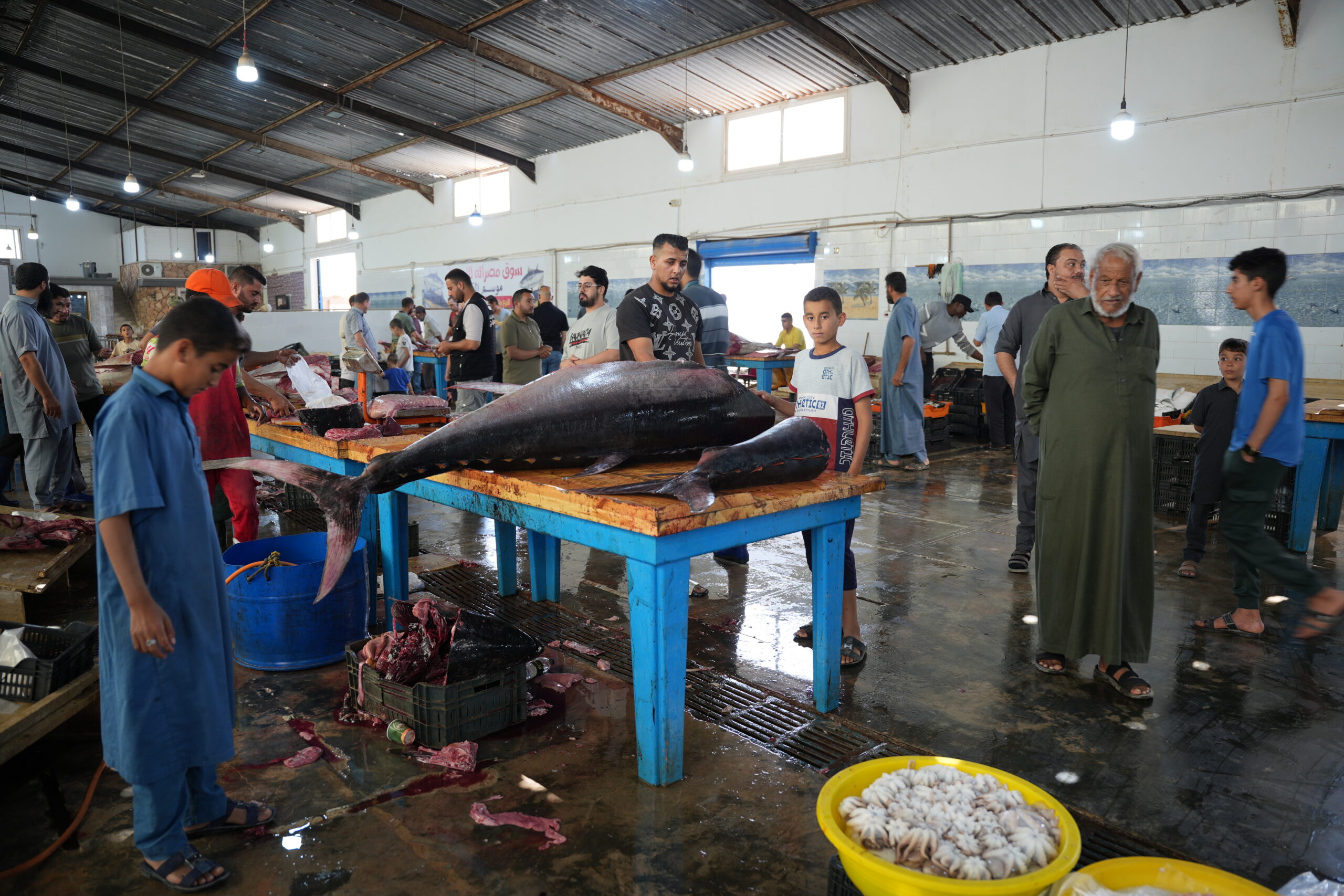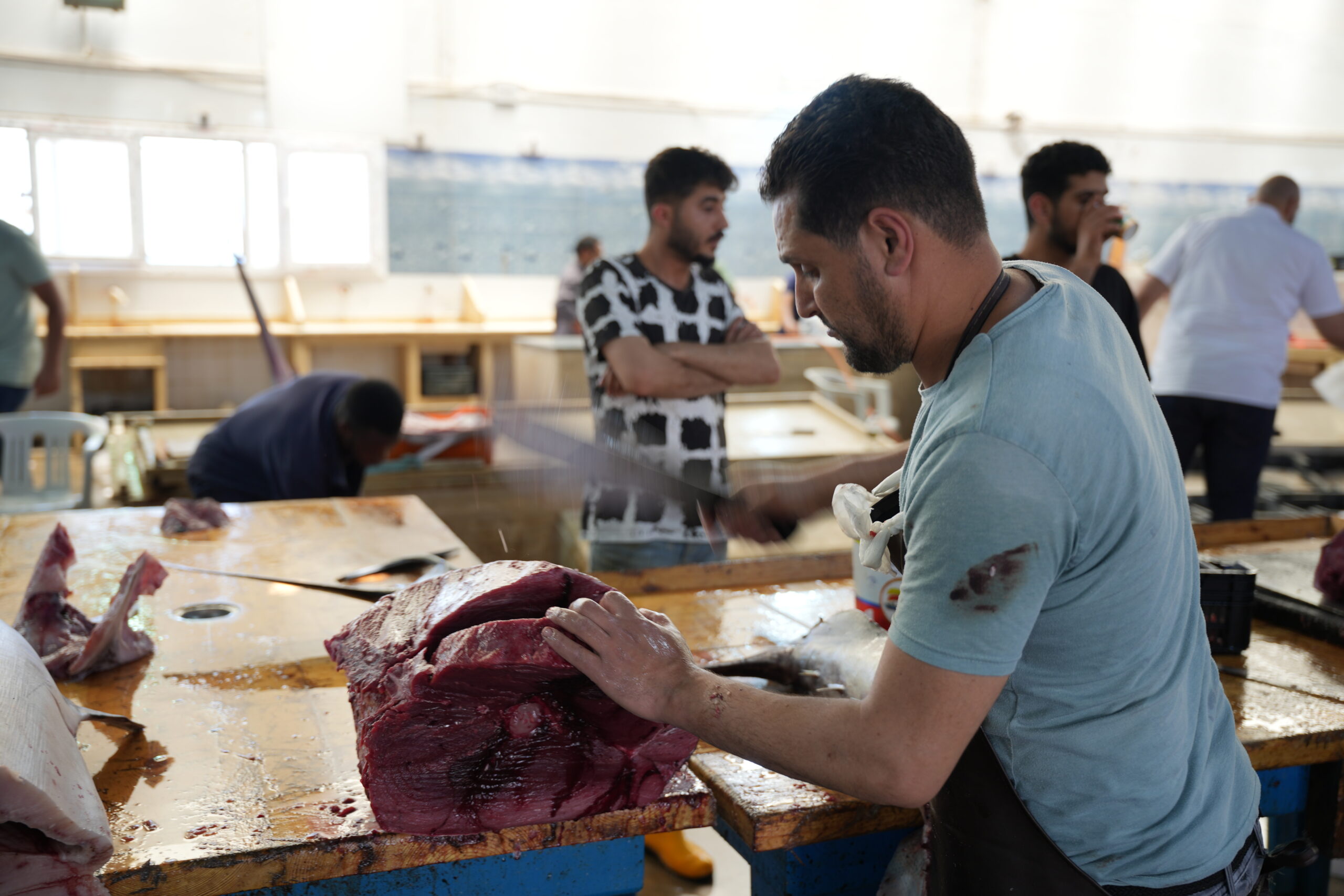At the port of Al Khums, Libya, Faraj Abdelsadiq sits on the edge of his old wooden boat after a long fishing trip that began at dawn. This time, the catch is modest: a few small fish and several plastic bottles tangled in his worn-out nets.
He stretches his legs into the shallow water and looks out at the sea, once a symbol of hope, now a daily burden. “We work more and catch less. The sea is as exhausted as we are,” he says calmly, his tone concealing a deeper frustration.
Faraj, 46, doesn’t hide his disappointment over the steep decline in fish stocks off Libya’s coast in recent years. “I’ve been at sea since I was 20, but I’ve never seen it this bad. Fish are disappearing, trawlers are sweeping the deep waters clean, and waste is everywhere.”
Not far from him, 29-year-old fisherman Mohamed Sweisi carries empty crates from his boat to the dock. When asked about his day’s haul, he answers with a wry smile, “My catch? Torn nets and not even enough fish to feed a child.”
Pointing toward the sea, he adds, “We used to fish over there. Today, that place is dead. Many species have simply vanished.”

While Libya’s fishermen struggle daily with this deteriorating reality, the world’s environmental attention turned to the city of Nice, France, where the third United Nations Ocean Conference (UNOC3) opened on 9 June 2025, with more than 15,000 participants in attendance, including 55 heads of state and government
Despite Libya having over 1,900 kilometers of coastline on the Mediterranean, its marine infrastructure is almost nonexistent.
There are no real marine reserves, no well-equipped ports to support the fishing industry, and no government programs to protect coral reefs or regulate fishing. Entire communities depend on the sea for their livelihoods, yet fishermen are left to face environmental decline alone.
Symbolic attendance
For the first time in years, Libya had an official high-level presence at such a summit, with Presidential Council head Mohamed Al-Menfi and Environment Minister Ibrahim Al-Arabi among the delegation. Though symbolically important, observers say the visit lacked substance.

Tunisian environmental expert Bassam Ibrahim, who attended with the Tunisian delegation, told Libya Al-Ahrar channel, “I followed Arab and foreign delegations. There was strong engagement from Algeria, Egypt, Morocco, even Mauritania. But the Libyan delegation had only a ceremonial presence. No panel discussions, no partnerships announced, and they quietly left on the second day.”
He added, “I spent hours searching for a Libyan presentation, panel, or even a pamphlet outlining an environmental vision. I found nothing. Even their public statements were vague and general, offering nothing researchers could use to build serious studies.”
“What happened in Nice was about showing up, nothing more. But the sea cannot be saved by appearances.” Abdulmajid Mlitane, environmental expert.
Despite the lack of concrete initiatives, President Al-Menfi gave an exclusive interview to Libya Al-Ahrar, saying: “We requested UNESCO and EU representatives to conduct field visits to the Libyan coast to help revive environmental studies that have been suspended for over 10 years.” He added that Libya hopes for technical support to prepare a comprehensive environmental map.
But the statement, while symbolically significant, lacked any timeline or implementation plan, making it, in the eyes of many, another unfulfilled promise.
Plastic invasion in Libya
Libya’s chargé d’affaires in Paris, Fathi Omaima, also told Libya Al-Ahrar on the conference sidelines that participating in such events could help Libya preserve its marine resources. He said they are currently preparing a map of coastal erosion and pollution along Libya’s shoreline, but the effort remains in the planning phase with no confirmed funding or international cooperation.
Environmental expert Abdulmajid Mlitane described Libya’s presence at the summit as a symbolic gesture. “What happened in Nice was about showing up, nothing more. But the sea cannot be saved by appearances. We need decisions, real programs, and marine protected areas. What’s left of marine life in Libya is vanishing rapidly.”
“All we ask is for the state to look at our situation. The sea no longer feeds us, and everything is now unbearably expensive.” Faraj Abdelsadiq, fisherman in Al Khums.
He added: “This isn’t just about fish or water. Entire communities depend on the sea. Today’s fisherman has no alternative, and the sea is being looted before their eyes. There’s no oversight, no prosecutions, and no enforced laws. We’re on the edge of a silent environmental disaster.”
30×30 Initiative
Experts point out that Libya lags far behind its neighbors in joining global environmental initiatives. Tunisia and Egypt, for example, are actively working to implement the 30×30 commitment, a global pledge to protect 30 percent of coastal and marine areas by 2030. Libya has not announced any similar vision, or even a plan to meet a minimum benchmark.
At the Nice Summit, discussions focused on illegal fishing, marine pollution, and climate change. Countries presented marine life protection initiatives, regulated fishing practices, and marine reserve mapping. Libya was absent from these efforts.
In Al Khums, Abdelsadiq has no interest in these diplomatic details. He just wants support. “All we ask is for the state to look at our situation. We buy nets with our own money, and repair our boats with debt. The sea no longer feeds us, and everything is now unbearably expensive.”

Sweisi believes that hope lies in involving fishermen in decision-making. “We know the sea better than any official in an office. We can restore it, if we’re given the means.”
Despite his frustration, Sweisi doesn’t hide his hope that even a symbolic Libyan presence could spark real action. “If there’s real intention, let it begin with us. We know the sea. We know how to bring it back to life. Just listen to us.”
As the sun sinks toward the horizon, the fishermen begin folding their nets, preparing for another day that promises little.
This story was produced as part of the 2025 UNOC Fellowship organized by Internews’ Earth Journalism Network. The article was first published in Arabic on Al Ahrar on 19 June 2025.